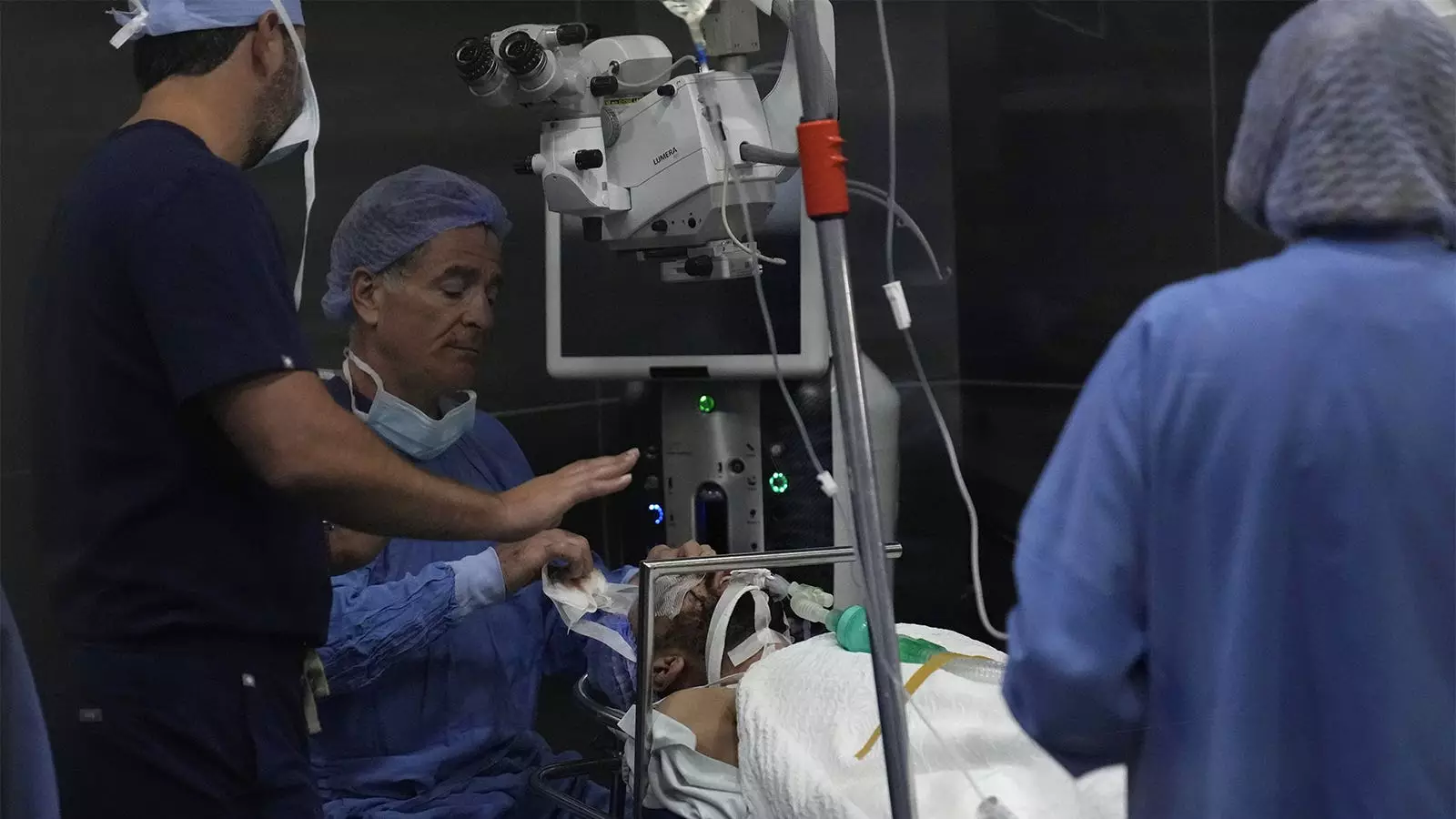In recent days, Lebanon has witnessed a significant and tragic surge in eye injuries due to a catastrophic explosion of communication devices, primarily used by the militant group Hezbollah. Eyewitness accounts recount a harrowing scene in hospitals overwhelmed with casualties. Dr. Elias Jaradeh, an ophthalmologist who is also a reformist lawmaker, finds himself at the center of this medical crisis, tirelessly striving to provide care to an unprecedented number of patients. The instruments of this tragedy were not conventional weapons but rather pagers and walkie-talkies that detonated when their users were distracted by incoming messages.
The chaos began when thousands of these handheld devices, presumably neutral in their ordinary function, exploded in unison, resulting in a heart-wrenching loss of life and widespread injuries, particularly to the eyes. Official reports indicate that at least 39 individuals lost their lives in the blasts, while around 3,000 more experienced significant injuries, many of them involving life-altering disabilities. This alarming situation has drawn comparisons to past incidents, including the devastating port explosion in Beirut four years prior, but the nature and extent of the injuries this time have overwhelmed even seasoned medical professionals like Dr. Jaradeh.
Lebanon has a tragic history marked by civil war and conflict, leading to considerable trauma within its population and healthcare system. However, the current crisis reveals a different dimension of the ongoing struggle. Dr. Jaradeh expressed his emotional turmoil in response to the influx of young men, women, and even children with severe eye trauma. He has performed countless operations, often working on less than two hours of sleep, an alarming statistic that highlights the dire circumstances faced by Lebanese medical professionals. The injuries stem from shrapnel embedded in victims’ eyes, which further complicates treatment and raises questions about the long-term vision prognosis of those injured.
The sheer volume of casualties has left hospitals reeling, a reflection of the broader ramifications of political strife and military actions in the region. In a country where healthcare has long been strained and fragmented, this crisis reveals another layer of vulnerability that impacts not just the victims but also healthcare providers. Dr. Jaradeh, who previously operated in the shadow of the Beirut port explosion, remarked on the profound difference in handling this modern crisis compared to the past. “It is not just an injury; it is a statement about the state of our humanity,” he said, underlining that the current wave of trauma extends beyond physical injuries to emotional scars and societal distress.
As the Lebanese people grapple with another incident of mass casualties tied to their protracted political struggles, the international community watches with bated breath. While speculations about Israel’s involvement in the explosions linger, the focus for many remains on the victims and their families. The devastation caused by these explosions is not merely physical; it is intertwined with the ongoing narrative of conflict in Lebanon and the broader Middle Eastern landscape.
Dr. Jaradeh’s struggle to maintain emotional detachment while operating is emblematic of a deeper societal pain. For him and many medical practitioners, separating the distress of patients from their responsibilities becomes increasingly difficult when confronted with large numbers of injured civilians, particularly from a demographic often seen as the country’s future. “The numbers are staggering, and the grief permeates every action we take in the operating theater,” he remarked.
As Lebanon faces this profound medical crisis amid ongoing political instability, it becomes essential for local and international organizations to prioritize support for healthcare systems and mental health resources. The emotional toll on those providing care cannot be overstated; the healthcare professionals are not just treating wounds but also bearing witness to the often invisible scars left by decades of conflict and instability.
The recent surge in eye injuries in Lebanon is intricately connected to both individual tragedies and broader societal issues. Dr. Jaradeh’s experience highlights the urgent need for both immediate medical intervention and long-term healing strategies to address the psychological and physical impacts of such violent episodes. Without significant changes, the humanitarian toll will only continue to grow, requiring solidarity from both within Lebanon and the international community to foster a future devoid of such tragedies.

Leave a Reply